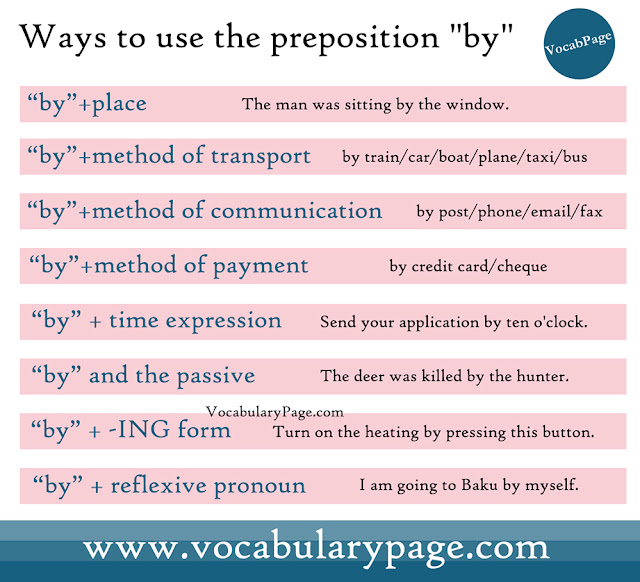By and place
We use the preposition by to mean "near", "beside" or "at the side of".- The man was sitting by [=besides] the window.
- There is a cottage by the sea.
By and method of something
We use "by" to show how or in what something is donea) a particular method of transport
by train/car/boat/plane/taxi/bus- I decided to go by plane.
- They go to school by bus.
by air/land/sea/rail
- I have never travelled by sea before.
- They often go to England by air.
b) a particular method of communication
by post/phone/email/fax etc- I'll send the contract to you by post.
- They spoke by telephone.
c) a particular method of payment
by credit card/cheque- We paid by credit card.
- May I pay by cheque?
By and time
We use "by" to show deadlines or the end of a time period.- Can you finish your work by tomorrow?
- The documents should be ready by Monday.
- Please send your application by ten o'clock.
By and the passive
If we want to show who or what does, creates or cause something in the passive voice, we use "by".- The deer was killed by the hunter.
- Who was this house built by?
- I was hit by a car.
By and -ing form
We use by +ing verb to show how something is done.- Turn on the heating by pressing this button. [=Press this button to turn on the heating.]
By and reflexive pronoun
If we want to say that someone did something alone or without help, we use the preposition by.by myself/yourself/himself/herself/itself/ourselves/yourselves/themselves
- I am going to Baku by myself.
- Emma lives by herself.
- He painted the wall by himself.
Multiplication and division
We use "by" when multiplying or dividing.- If you multiply five by 25 you get 125.
- 125 divided by 5 is 25.

Comments
Post a Comment